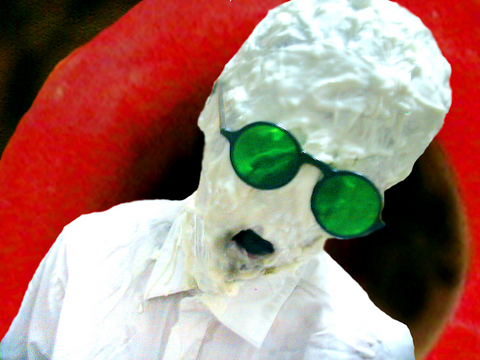If you rate your plays according to the amount of time you spend thinking about them afterward then Riverbed's shows should be near the top. Blurring the boundaries between visual and performing arts is a Riverbed Theatre (
The company's last production, Life and Times of Robert Wilson took the audience on a journey into mind of the man who revolutionized contemporary theater in the early seventies. It was a 90-minute multimedia installation with ultra-slow, almost ritualistic actions and exceptional stage design.
Inspired by the animated shorts of the Brothers Quay, who are likened to Czech animation legend Jan Svankmajer, Riverbed's latest production, Exploding Rice, takes a similar non-linear and surreal approach but applies it to theater.

PHOTO COURTESY OF RIVERBED THEATRE COMPANY
The dreamlike atmosphere it creates is not light and breezy. It is dark, heavy and slightly disturbing, yet visually and mentally stimulating.
At a preview of the play on Tuesday, the slow-paced movements of the actors and existential undertones were reminiscent of Radiohead's part animation, part live-action music video There, There.
During the press conference, artistic director Craig Quintero answered a question about the meaning of his play by saying there wasn't one and that he "wanted to leave blanks for the audience to fill in on their own. Allow them to make their own story, from their own experiences."
Perhaps the best way to enjoy a Riverbed production is not to try to make sense out of it, but to sit back and enjoy it.
Performances run tonight, tomorrow and Sunday at Taipei Artist Village with shows at 7:30pm and weekend matinees at 2:30pm. Tickets cost NT$350 and are available at the door or online at www.artstiket.com.tw. The Taipei Artist Village is located at 7, Beiping Rd, Taipei (

Towering high above Taiwan’s capital city at 508 meters, Taipei 101 dominates the skyline. The earthquake-proof skyscraper of steel and glass has captured the imagination of professional rock climber Alex Honnold for more than a decade. Tomorrow morning, he will climb it in his signature free solo style — without ropes or protective equipment. And Netflix will broadcast it — live. The event’s announcement has drawn both excitement and trepidation, as well as some concerns over the ethical implications of attempting such a high-risk endeavor on live broadcast. Many have questioned Honnold’s desire to continues his free-solo climbs now that he’s a

As Taiwan’s second most populous city, Taichung looms large in the electoral map. Taiwanese political commentators describe it — along with neighboring Changhua County — as Taiwan’s “swing states” (搖擺州), which is a curious direct borrowing from American election terminology. In the early post-Martial Law era, Taichung was referred to as a “desert of democracy” because while the Democratic Progressive Party (DPP) was winning elections in the north and south, Taichung remained staunchly loyal to the Chinese Nationalist Party (KMT). That changed over time, but in both Changhua and Taichung, the DPP still suffers from a “one-term curse,” with the

Jan. 26 to Feb. 1 Nearly 90 years after it was last recorded, the Basay language was taught in a classroom for the first time in September last year. Over the following three months, students learned its sounds along with the customs and folktales of the Ketagalan people, who once spoke it across northern Taiwan. Although each Ketagalan settlement had its own language, Basay functioned as a common trade language. By the late 19th century, it had largely fallen out of daily use as speakers shifted to Hoklo (commonly known as Taiwanese), surviving only in fragments remembered by the elderly. In

William Liu (劉家君) moved to Kaohsiung from Nantou to live with his boyfriend Reg Hong (洪嘉佑). “In Nantou, people do not support gay rights at all and never even talk about it. Living here made me optimistic and made me realize how much I can express myself,” Liu tells the Taipei Times. Hong and his friend Cony Hsieh (謝昀希) are both active in several LGBT groups and organizations in Kaohsiung. They were among the people behind the city’s 16th Pride event in November last year, which gathered over 35,000 people. Along with others, they clearly see Kaohsiung as the nexus of LGBT rights.